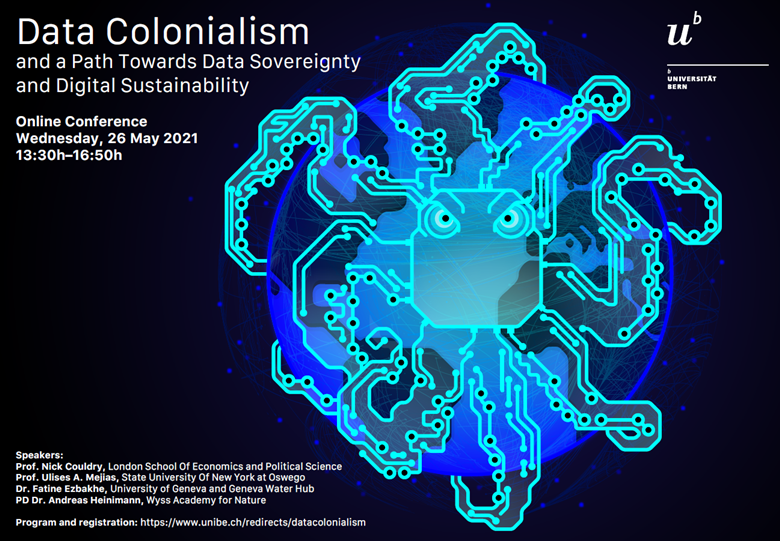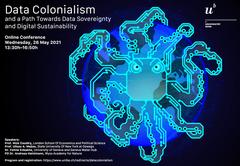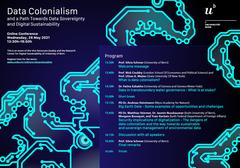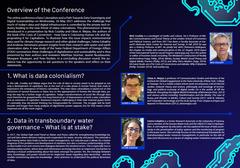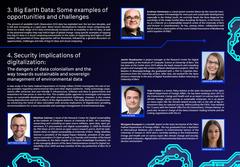Data Colonialism and a Path Towards Data Sovereignty and Digital Sustainability
Report for the Federal Department of Foreign Affairs FDFA:
"Security implications of digitalization: The dangers of data colonialism and the way towards sustainable and sovereign management of environmental data"
Authored by PD Dr. Matthias Stürmer, Dr. Jasmin Nussbaumer, and Pascal Stöckli
30 June 2021
DOI: 10.13140/RG.2.2.24791.80807
Online Conference on Wednesday, 26 May 2021
| 13:30h | Prof. Silvia Schroer (University of Bern): Welcome message |
| 13:40h | Prof. Nick Couldry (London School Of Economics and Political Science) and Prof. Ulises A. Mejias (State University Of New York): What is data colonialism? |
| 14:30h | Dr. Fatine Ezbakhe (University of Geneva and Geneva Water Hub): Data in transboundary water governance - What is at stake? |
| 15:00h | Short break |
| 15:15h | PD Dr. Andreas Heinimann (Wyss Academy for Nature): Big Earth Data - Some examples of opportunities and challenges |
| 15:45h | PD Dr. Matthias Stürmer, Dr. Jasmin Nussbaumer (both University of Bern), Morgane Bousquet, and Yvan Keckeis (both Federal Department of Foreign Affairs): Security implications of digitalization - The dangers of data colonialism and the way towards sustainable and sovereign management of environmental data |
| 16:15h | Discussion with all speakers |
| 16:45h | Prof. Silvia Schroer (University of Bern): Final remarks |
| 16:50h | Finish |
This is an event of the Vice-Rectorate Quality and the Research Center for Digital Sustainability of University of Bern
Overview of the Conference
The online conference "Data Colonialism and a Path Towards Data Sovereignty and Digital Sustainability" on Wednesday, 26 May 2021 addresses the challenge that much of today's data and digital infrastructure is controlled by the private tech industry leading to the new threat of "data colonialism". This phenomenon is being introduced in a presentation by Nick Couldry and Ulises A. Mejias, the authors of the book "The Costs of Connection - How Data Is Colonizing Human Life and Appropriating It for Capitalism". To illustrate how this issue impacts environmental data used for climate change research and other global challenges, Fatine Ezbakhe and Andreas Heinimann present insights from their research with water and earth observation data. A new study of the Swiss Federal Department of Foreign Affairs (FDFA) summarizes these challenges of digitalization and sustainability and is thus presented by their authors and reviewers Matthias Stürmer, Jasmin Nussbaumer, Morgane Bousquet, and Yvan Keckeis. In a concluding discussion round, the audience has the opportunity to ask questions to the speakers and reflect on their statements.
1. What is data colonialism?
In this talk, Couldry and Mejias argue that the role of data in society needs to be grasped as not only a development of capitalism, but as the start of a new phase in human history that rivals in importance the emergence of historic colonialism. This new "data colonialism" is based not on the extraction of natural resources or labor, but on the appropriation of human life through data, paving the way for a further stage of capitalism. Today’s transformations of social life through data must therefore be grasped within the long historical arc of dispossession as both a new colonialism and an extension of capitalism. Resistance requires challenging in their new material guises forms of coloniality that decolonial thinking has foregrounded for centuries. The struggle will be both broader and longer than many analyses of algorithmic power suppose, but for that reason critical responses are all the more urgent.
Nick Couldry is a sociologist of media and culture. He is Professor of Media Communications and Social Theory at the London School of Economics and Political Science, and from 2017 has been a Faculty Associate at Harvard’s Berkman Klein Center for Internet and Society. In fall 2018 he was also a Visiting Professor at MIT. He jointly led, with Clemencia Rodriguez, the chapter on media and communications in the 22 chapter 2018 report of the International Panel on social Progress: www.ipsp.org. He is the author or editor of fourteen books including The Mediated Construction of Reality (with Andreas Hepp, Polity, 2016), Media, Society, World: Social Theory and Digital Media Practice (Polity 2012) and Why Voice Matters (Sage 2010). His latest books are "The Costs of Connection" and "Media: Why It Matters" (Polity: October 2019). nickcouldry.org
Ulises A. Mejias is professor of Communication Studies and director of the Institute for Global Engagement at the State University of New York, College at Oswego. He is a media scholar whose work encompasses critical internet studies, network theory and science, philosophy and sociology of technology, and political economy of digital media. He is the author of Off the Network: Disrupting the Digital World (University of Minnesota Press, 2013) and various articles including ‘Disinformation and the Media: The case of Russia and Ukraine’ in Media, Culture and Society (2017, with N. Vokuev), and ‘Liberation Technology and the Arab Spring: From Utopia to Atopia and Beyond’ in Fibreculture (2012). ulisesmejias.com
2. Data in transboundary water governance - What is at stake?
In 2017, the Global High-Level Panel on Water and Peace called for strengthening knowledge-based and data-driven decision making and cooperation for water, security and peace. The rationale is that having better data leads to better water management, not only because it allows for a better diagnosis of the problems and development of solutions, but also a common understanding of these data builds trust and constructive dialogues between the involved actors. This is especially true in transboundary waters, where data and information exchange become an important mechanism to develop a mutual understanding about the basin amongst the parties. Yet, the interplay between data, knowledge, and power should not be neglected. Issues regarding data ownership - and the models transforming data into knowledge - merit attention to understand the political dimension of data.
Fatine Ezbakhe is a Senior Research Associate at the University of Geneva, and a member of the Geneva Water Hub and the UNESCO Chair in Hydropolitics. A civil engineer by education, she has explored the issue of data uncertainty in the prioritization of policy options and the monitoring of progress in the water sector. She currently focuses on the institutional frameworks for (transboundary) water resources management, in particular on the role of data (and discourses) as a means of shaping water institutions and policies.
3. Big Earth Data: Some examples of opportunities and challenges
The amount of available Earth Observation (EO) data has exploded over the last two decades, and is still ever increasing at a rapid pace. More recent developments towards cloud computing platforms for a wide range of EO data tremendously increased the accessibility to the EO data, as well as the potential insights they may hold in light of global change. Using specific examples of tapping into big EO data in a cloud computing environment in the realm of supporting land rights of small holders, the potential of these approaches will be illustrated, followed by a general discussion on opportunities, challenges and risks of big EO data and cloud computing.
Andreas Heinimann is a land system scientist driven by the concrete transformative power of knowledge for more just and sustainable development, especially in the Global South. He currently heads the three Regional Stewardships of the newly funded Wyss Academy for Nature. In his former roles as a Director at a sustainability research center of the University of Bern and lecturer in Geoinforamtics, he has, among others, collaborated with NASA and was a lead author of the recent Global Assessment of Biodiversity and Ecosystem of IPBES.
4. Security implications of digitalization: The dangers of data colonialism and the way towards sustainable and sovereign management of environmental data
A new study of the Swiss Federal Department of Foreign Affairs (FDFA) investigates the role of service providers regarding environmental data and other digital platforms. Today technology corporations offer attractive and user-friendly IT infrastructure, software and data to governments and researchers for low prices or even for free. This enables public agencies to investigate and improve issues on sustainable development and other environmental challenges. However, it also creates strong dependencies and lock-in effects of the digital platforms. The study illustrates this phenomena connecting the trend of data colonialism with security implications of digitalization providing recommendations for a more sustainable and sovereign management of environmental data.
Matthias Stürmer is head of the Research Center for Digital Sustainability at the Institute of Computer Science at University of Bern. He is teaching, researching and consulting on open source software, open data, open government, ICT procurement and digital sustainability. In 2009 he finished his PhD thesis at ETH Zürich on open source research and in 2020 his habilitation thesis on digital sustainability at University of Bern. Today, Matthias Stürmer is president of the Digital Impact Network, president of the open source association CH Open as well as co-founder and member of the board of Opendata.ch, the Swiss chapter of the Open Knowledge foundation. He is also managing director of the Swiss Parliamentarian Group for Digital Sustainability since 2009 and was member of the city parliament of Bern for 8 years.
Jasmin Nussbaumer is project manager at the Research Center for Digital Sustainability at the Institute of Computer Science at University of Bern. She has been at the Center since 2019 where she leads research and consulting projects and manages the centre's software development projects. After her Masters in Neuropsychology she graduated with a PhD in Cognitive Neurosciences from the University of Bern. After that, she worked for the Swiss Distance University in the area of Digital Transformation before returning to University of Bern.
Yvan Keckeis is a Senior Policy Advisor at the State Secretariat of the Swiss Federal Department of Foreign Affairs. He has been working since 2015 in the Environment, Energy and Health unit as an expert on various topics like climate change, carbon pricing or sustainable embassies. He is an expert on nexus topics like the climate-related security risks or the role of big environment data on national security. Before joining the FDFA, Yvan worked for 12 years with the Federal Office for the Environment, Climate Division. In particular, he was in charge of the Swiss Emissions Trading Scheme and the Linking negotiations with the EU.
Morgane Bousquet is a scientific expert at the State Secretariat of the Swiss Federal Department of Foreign Affairs. She has graduated from a Bachelors in International Relations and a Masters in Environmental Science of the University of Geneva in 2020 and is currently working in the Environment, Energy and Health unit on various topics like climate change and security, sustainable embassies, digitalization of environmental data and emission reduction mechanisms.

